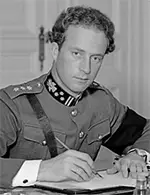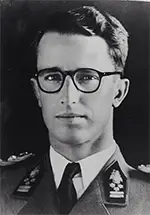King Baudouin of Belgium
Baudouin was King of Belgium for more than four decades in the second half of the 20th Century. He was born on Sept. 7, 1930, in Stuyvenberg Castle, in Laeken, Brussels. His father was the eventual King Leopold III, and his mother was Astrid of Sweden. The reigning monarch when Baudouin was born was his grandfather, Albert I. That king died unexpectedly in 1934, and Leopold became king. Young Baudouin suffered another tragedy the following year when his mother died in a car accident. His father remarried six years later, to Mary Lilian Baels, and they had three children together; thus, Baudouin, who already had a brother and a sister, eventually gained three more siblings. The young heir to the throne began his officially courtly studies when he was 7, learning in both Dutch and French. As well, he was a familiar sight at the side of his father during public appearances. 
Just before Baudouin's 9th birthday, World War II began. The following year, 1940, Germany invaded Belgium. Baudouin's father had, at age 12, fought for a time against Germany in World War I. He had a different response to the Nazi invasion. After more than two weeks of blitzkrieg barrages, Leopold (left) surrendered. Prime Minister Hubert Pierlot and many of the rest of the Belgian government fled to Allied lands, setting up a government in exile. The occupying German army held Leopold prisoner. The king had enough time to ensure that his children were sent to safety: Baudouin and his sister and brother, Josephine-Charlotte and Albert, went to France and then on to Spain while their father stayed in Belgium and tried to negotiate a peace. It was while Leopold was under house arrest that he married Lilian. Allied troops liberated Belgium in 1945, by which time Leopold and Lilian had been moved to Germany. Allied forces rescued them in the closing days of the war, but they did not return home because resentment of his actions was still too high; instead, they spent six years in Switzerland, in exile. Baudouin, meanwhile, continued his schooling, in Switzerland. Leopold's brother, Prince Charles, served as regent during this time. Many people in Belgium still resented Leopold for surrendering to Germany. A referendum in 1950 resulted in more than half of people saying that were in favor his returning. This sentiment was nowhere near being universal, however, and when he and his family returned home, on July 22, 1950, he confronted a general strike, which turned violent and ended with deaths caused by soldiers firing into a crowd of protesters. A shocked Leopold agreed to grant his oldest son, then 20, regency powers. This occurred on August 11, 1950. Opposition to Leopold's return as king was still very strong, and so he decided to abdicate. On July 17, 1951, Baudouin took the oath of office and became king. 
The new king got married in 1960, to Do Fabiola de Mora y Aragon, who was a nurse and came from a noble family. They had no children together. In that same year, Baudouin granted independence to the Belgian Congo, which his country had ruled since the days of his great-grandfather, Leopold II. At the ceremony announcing that independence, Baudouin gave a speech that highlighted the successes of Leopold II, who was known to have sanctioned harsh work practices in the Congo Free State that led to millions of death. During that same ceremony, the new country's first democratically elected prime minister, Patrice Lumumba, issued a condemnation of the actions of the Belgian government and monarchs, not only Leopold II but also his successors. The enmity between Baudouin and Lumumba was strong, and he did not act to prevent a plot that eventually resulted in her assassination. Baudouin continued as monarch, presiding over Cold War tensions and the introduction of international organizations such as the European Union and NATO. He died of heart failure on July 31, 1993, in Motril, Spain. His younger brother ascended to the throne, becoming King Albert II. |
|
Social Studies for Kids
copyright 2002–2024
David White




